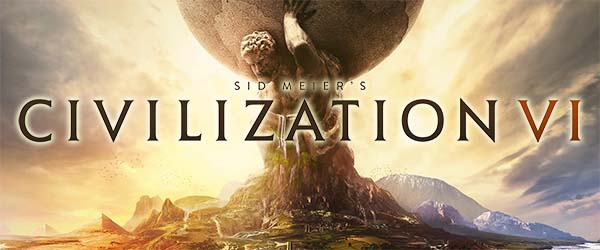
I already gave a pretty glowing review of Civilization VI. I did neglect talking about some of the problems and annoynaces that I have with the game. This is because most of these problems feel like relatively minor, nagging issues, rather than game-breakers, and the review was long enough as is without diving into nitpicks. So I decided to dedicate an entire post to these little nagging issues, nitpicks, and annoyances. Remember that I love the game! So the items listed here are not deal-breakers by any stretch. They are just small blemishes on an excellent game, and problems that I would like to see fixed in post-release patches.
Useability issues
While the game's UI is generally very minimal and clean, there are a number of frustrating issues with the user experience design.
Stop jumping around to different units!
Civ V had this same problem as well. The one-unit-per-tile rule means that after one unit moves, the game can't just skip to the next unit in the stack. Instead, it has to pick a unit somewhere else on the map. The logic for this doesn't seem to even bother trying to find a nearby unit or a relevant unit, and so the camera is constantly whipping around from one end of the map to the other. When trying to manage a large army during a war, this can get very annoying very fast.
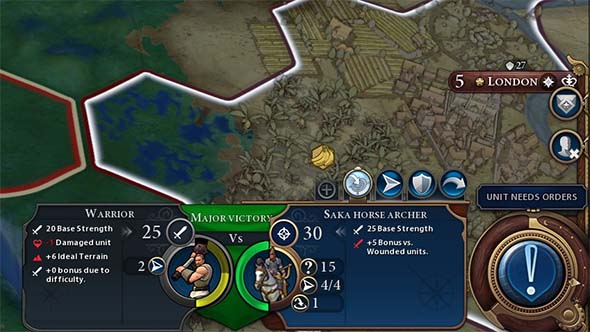
There's already a "Unit needs orders" prompt, so there's no need to jump around the map selecting units.
If suitable logic can't be implemented to make this unit-cycling work a bit smarter, then players should be given the option (via the options screen) to disable it entirely. This is especially true for multiplayer. There is already a "Unit needs orders" prompt, so it's easy enough to just use that to jump to another unit. Otherwise, the game should just wait and let the player actively click on the next unit that I want to move. Heck, even if smarter unit-cycling logic is written, the game should probably still provide the option to turn it off.
Allow us to disable tutorial tips that we've already seen
Each tutorial tooltip dialogue should come with an option to "don't show this tip again". Civ games are long, and they often aren't played through to completion. So when learning the game, I end up restarting often. And since the game is still new, I still have the tutorial tooltips turned ON. I do this so that I can be reminded of how the newer features work (particularly the late-game features that I haven't seen as much).
In order to see the late-game tutorials [RIGHT] for mechanics that I don't understand yet,
I have to sit through the tutorial messages for early-game mechanics [LEFT] that I fully understand.
Leaving the tutorials on, however, means that I have to sit through all the early-game pop-ups as well. I already know how a district works and what a city state is; I don't need to see these tutorial messages again! But it is nice to see the messages for late-game stuff like national parks, archaeology, and corps, since I still don't have much experience with those features yet.
As such, I should be able to turn off the tips that I've already seen and know, while leaving on the tips that I haven't seen, or don't yet know... [More]
eb02599a-204a-499d-b6c0-b6536654aee2|1|5.0
Tags:Sid Meier's Civilization, Civilization VI, civilization, strategy, grand strategy, turn-based strategy, history, user interface, tutorial, barbarians, AI, surprise war, notifications, diplomacy

Firaxis has given me a belated birthday gift by releasing Civilization VI. They've also ensured that I don't get very much productive done during the months of October and November this year, since I've been sinking a whole lot of time into "one more turn"-ing myself late into the night. I've barely scratched the surface of the newly-released Dark Souls III DLC, my Madden franchise has fallen behind, and I haven't even bothered buying recently-released games like the new Master of Orion. My board game collection has been collecting dust, and my Dungeons & Dragons campaigns have been on hiatus. I'll get back to all those things after one more turn.
Oozing with production quality
The first thing that stood out to me upon entering my first game was the artwork. It's a pretty stark contrast from Civilization V's visuals. Civ V favored a semi-photo realistic quality. Many screenshots of the game's map look like satellite photos, and units (though exceedingly large) looked and animated realistically. This created a lot of pretty screenshots (still images), but the game looked kind of static, washed-out, and dull in motion. VI, on the other hand, goes for an exaggerated, vibrant, and more cartoonish look that reminds me a lot more of Civ IV and Civ Revolution.
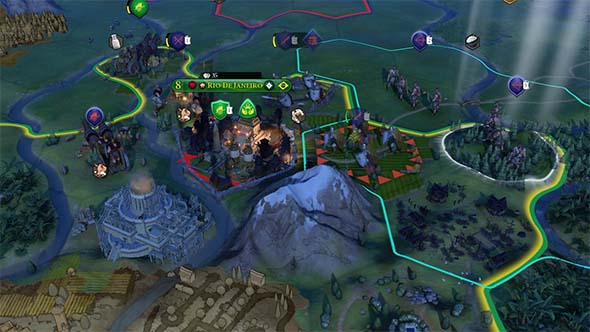
The graphics are vibrant and highly informative. Everything that you see on screen genuinely means something.
What I really like is how utilitarian the visuals are. Almost everything on the game map is communicating part of the state of the game to the player. You can see every piece of infrastructure in and around a city, as well as exactly which tiles are being worked, all without having to open a separate screen and without having to clutter the screen with extra UI icons. There's even different graphics to represent the different phases of a building or wonder's construction that tells you exactly what that city is currently constructing, and how close it might be to finishing that wonder. It's attractive, but it's also clean and informative.
The fog of war is also wonderfully functional and neat to look at. This game renders the fog of war with the style of a hand-drawn map on canvas (similar to Total War: Shogun 2, which I loved). Heck, there's even an animated day/night cycle that was seemingly added because ... why not?
Improvements have different graphics for when they're un-worked [LEFT] versus worked [RIGHT].
The rest of the game shows similarly high production quality. There's actual cinematics for the win screens instead of dialogue boxes with a static image. Finishing a wonder results in an in-game cutscene of that wonder's construction. It isn't quite as pretty as Civ IV's pre-rendered wonder movies, but makes up for it by providing a sense of context that makes me feel like I'm seeing "my Oracle" instead of just the Oracle. There's more historic quotes, all of which are narrated wonderfully by Sean Bean. Firaxis even brought back composer Christopher Tin for some of the music. The new theme music, "Sogno Di Volare" ["The Dream of Flight"] isn't as immediately catchy as "Baba Yetu", but it's still an uplifting, memorable track that stands out more than the menu themes of Civ V. Put simply, this game just looks and sounds terrific... [More]
b970ea1d-5fb2-48fe-9374-28eaf71e348a|2|5.0
Tags:Sid Meier's Civilization, Civilization VI, civilization, strategy, grand strategy, turn-based strategy, history, humanism, humanist, Civilopedia, city, empire-building, districts, hex, civic, social policy, diplomacy, Ed Beach, Christopher Tin, Sean Bean
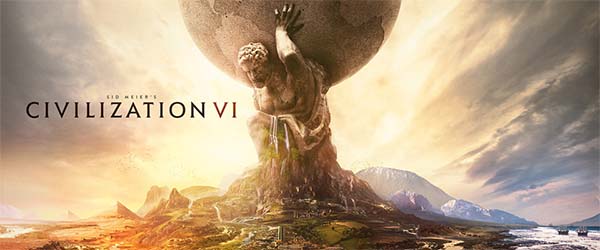
A few weeks ago, Firaxis and 2K Games ensured that fall of 2016 is going to be very busy for me. They announced Sid Meier's Civilization VI, which is due out October 21. Believe it or not, my reaction to this was actually a little bit mixed. While a new Civ game is obviously exciting, I have to fight back a feeling that it's too soon.
For one thing, I was expecting at least one more expansion for Beyond Earth, which I feel still has some annoying holes in its gameplay (most notably, its air units and generally dull orbital layer). If those holes were filled, and if the game's map could change over the course of the game, then Beyond Earth has the potential to rise out of mediocrity and stand at the same level as Civ V as a unique and engrossing sci-fi strategy game. Now, that looks very unlikely. Since the first expansion (Rising Tide) would expand the shallow naval and ocean gameplay, I had expected that a second expansion (which I had personally code-named "Falling Skies") would expand air units and orbital gameplay and maybe add flying cities.
Sean Bean introduces us to Sid Meier's Civilization VI - due October 21st.
The other reason that I felt Civ VI is too soon is because I was still hoping to get back into modding for Civ V. I still had one massive mod that I've been working on off-and-on for years that just needed some bug fixes and polish before I could release it. I had put off finishing it until after I'd completed my series of strategy guides for Civ V, and I was hoping for a few years in between games so that I could finish the mod and have time for people to play it. But now that Civ VI is announced, I feel less motivated to bother with that mod, since most players (including, most likely, me) will move onto Civ VI come October anyway. Maybe I'll work up the motivation to get that mod out anyway; we'll see. In any case, I'll hopefully get more into modding for Civ VI earlier so that I can release more content for that game, and maybe make some more ambitious projects...
The good news is that Civ VI does look to be fulfilling one of my wishes of being more focused on empire-management... [More]
a923a46b-608d-45e4-84d5-b592b2684a88|3|4.7
Tags:Sid Meier's Civilization, Civilization VI, Firaxis, civilization, 2K Games, strategy, history, hexes, city, districts, wonders, Theodore Roosevelt, Civilization: Beyond Earth, Civilization: Beyond Earth: Rising Tide, Civilization V, PC, Steam, Ed Beach, Sean Bean

In the comments of a recent post about Silent Hill 2's Otherworld, I had a discussion with a reader about the time period in which the Silent Hill games take place. This is actually an interesting and difficult topic, so I thought that I would dedicate a post specifically to it.
First and foremost, let's remind ourselves of when the games were released:
| Game title | Original release |
 | Silent Hill | January 1999 |
 | Silent Hill 2 | September 2001 |
 | Silent Hill 3 | May 2003 |
 | Silent Hill 4: the Room | September 2004 |
UPDATE 1 January 2020:
A recent tweet from Masahiro Ito claimed that Silent Hill 2 was set in the "late 70's or early 80's", which would make my estimates about 10 later than Masahiro Ito understood the setting to be. If we take evidence in the first Silent Hill game at face value, this would mean that Silent Hill 2 would have to take place prior to the events of Silent Hill, since Silent Hill can take place no earlier than 1987.
It is also possible that Ito's comment is referring to the aesthetics of the game (in keeping with many of the game's film and literary influences), and not necessarily to its actual timeline. It isn't that I don't trust Ito's memory or his authority, but Team Silent went to great pains to conceal the exact date of the games (as we'll discuss in the following post), so it seems that they wanted the years in which the games take place to be ambiguous to the players -- which kind of makes this entire exercise moot.
Contemporary fiction
It is very important to note that no specific dates ever appear in any of the Silent Hill games that were developed by Konami's internal Team Silent studio. If dates are provided, they are either only the month and day (and not the year), or they are time periods relative to the events of the game (such as referring to the "events of 17 years ago" in Silent Hill 3), or it is just the year of an historical event in the past (such as the document about the sinking of the Little Baroness). Even documents that you would expect to have dates (such as newspapers, journals, diaries, patient reports, and police records) are intentionally left dateless (or at least ambiguous).
In Silent Hill 2, there is a point in which James finds newspapers scattered around a hallway. Upon examining the floor or walls, James comments that the newspapers have today's date. This would have been a perfect opportunity for the developers to provide a specific date for the game, if they wanted to. They could have had James read the date on the paper to the player, or the paper itself (with its date) could have been made clearly visible. The developers didn't do this; they left it completely ambiguous.
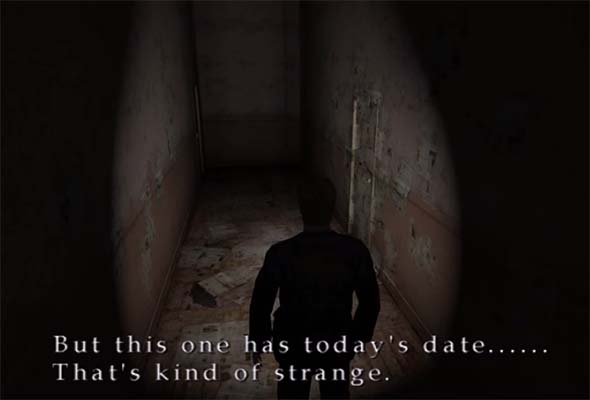
James notes that these newspapers have today's date, but doesn't tell us what the date is.
The developers went out of their way to not provide any specific dates for the games. Why would they do this? Typically, works of fiction that are not set in particular time period are written to be contemporary. Unless otherwise specified, most works of fiction should be assumed to take place now with respect to the consumption of the work by its audience, regardless of when "now" happens to be. if it's not contemporary to consumption, then it's usually contemporary to creation. This is usually pretty obvious if the work contains detailed descriptions of locations, technologies, and events that can be easily dated.
If we look at the original Silent Hill game in a vacuum, then the game provides no internal indication that it takes place at any specific time period. Players in 1999 probably had no reason to believe that the game took place in any year other than 1999. The same is true for Silent Hill 2, 3, and 4: if looked at in a vacuum, they can all be considered to take place in the same year that they were released. And if you didn't even know the year that the game was released, there's very little within the games to indicate that they take place at any time other than now.
However, this assumption falls apart because there is an absolute time difference of seventeen years between the events of the first game and the events of the third game, even though the difference in time between releases of the games was only four years. So we can't assume that each game takes place in the year of its release. At least one game has to be shifted on the timeline. So which game (or games) should be assumed to have taken place when? [More]
0ad2a2d3-abbc-4fd7-b255-126a5de4f3ba|8|4.8
Tags:Silent Hill, Silent Hill 2, Silent Hill 3, Silent Hill 4: the Room, history, Harry Mason, Heather Mason, James Sunderland, Maria, Henry Townshend, 1980s, 1990s, 2000s, 1986, 1987, 1994, 1999, 2003, 2008, 2016, Jeep Wrangler, telephone, cell phone, smart phone, rotary phone, computer, television, technology, anachronism, timeline, Konami, Team Silent, The Silence of the Lambs, Mary Shepherd-Sunderland
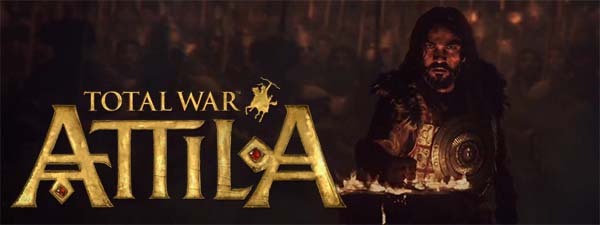
A few months ago, I posted an article outlining some suggestion for unique civilization themes and abilities for a possible Sid Meier's Civilization VI game. In it, I proposed a unique characteristic for the Huns or Mongolians: that they be a true nomadic empire. The idea was that they would have traveling cities that allowed them to move their empire with their army and essentially occupy any unclaimed territory or territory vacated by defeated rivals. Well, the Creative Assembly had already beaten me (and Firaxis) to the punch with Total War: Attila (and apparently Firaxis is embracing the idea with Beyond Earth's first expansion). Total War: Attila has a feature almost identical to what I had conceived for the Huns and Mongolians in Civilization. I'm a fan of the Total War series as is, so I was going to play this game for sure. Of course, Creative Assembly running with an idea that I had independently conceived of only made me more curious to play the game.
Attila acts as sort of a sequel to Rome II. While that game was all about building up the Roman empire (or whichever empire you happened to select), Attila is all about tearing down those empires. But this is a fully stand-alone game (like Napoleon Total War was to Empire Total War), and does not require Rome II in any way.
Learning how to be a horde
The Prologue campaign in this game is brutal! It's like a Demon's Souls tutorial that is designed to kick your ass. I restarted it once before realizing that it was designed for the player to fail in order to teach the new migration feature.
This prologue acts as a tutorial for the new features and mechanics of the game, but it doesn't do a particularly good job of teaching these mechanics. It also doesn't go into much detail of the established features of the franchise (other than telling you that a feature exists, then making you click on the button to do it), so new players might find themselves completely turned off by the fact that they are having their asses handed to them and aren't being taught much about how the game actually works, or - more importantly - why they are failing so hard. Perhaps having two separate tutorial campaigns would have been advisable: one to teach basic Total War concepts of empire and army management; and a second tutorial campaign for experienced Total War players that just teaches the migration features.
The brutal tutorial concludes with the challenging, climactic, historical battle of Adrianople,
in which your Visigoths must hold off Emperor Valens' superior army until your cavalry arrives.
Playing as migratory hordes minimizes city management, but you do still have to develop infrastructure for your nomadic armies. Rebuilding conquered cities and defending your borders, however, is not an issue - which was always the most tedious part of the game anyway. You don't need defensive armies in your territory and are free to focus all your efforts on your eventual goal. This change works well with the requirement that all armies must be attached to generals, and is a big step up from Rome II. There were large chunks of Rome II's campaign in which I felt like I couldn't do anything because I had to camp out my armies in cities in order to replenish and improve public order. Since I was at the army cap, the campaign would stagnate because I couldn't build new armies in order to watch over my newly-conquered settlements while also pressing forward with my primary armies... [More]
da530405-0213-4b1a-93c4-503924d797fd|0|.0
Tags:Total War, Total War: Attila, Creative Assembly, Sega, PC, Steam, Attila, Attila the Hun, Huns, Rome, Western Roman Empire, Eastern Roman Empire, Constantinople, Byzantine Empire, Sassanid Empire, Europe, Goths, Visigoths, Ostragoths, Germanic tribes, Franks, Saxons, Vandals, strategy, turn-based strategy, real-time strategy, grand strategy, history, campaign, horde, migration, climate change, the Great Migration, steppe, Sid Meier's Civilization, war, nomad, siege
|

| 12 | | | | | | | 60 | | 11 | | | | | | | 55 | | 10 | | | | | | | 50 | | 09 | | | | | | | 45 | | 08 | | | | | | | 40 | | 07 | | | | | | | 35 | | 06 | | | | | | | 30 | | 05 | | | | | | | 25 | | 04 | | | | | | | 20 | | 03 | | | | | | | 15 | | 02 | | | | | | | 10 | | 01 | | | | | | | 05 |
|